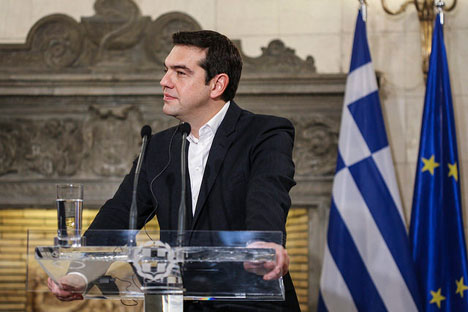
Steady access to safe, drinkable water is still a privilege, and Europe is struggling with ever-worsening droughts. The new episode of the Standard Time talk show discusses chemical hazards, eco guerrillas, and why we can never have enough pelicans.
Greece doesn’t just need debt relief, it deserves it. Of this much Thomas Fazi is convinced. After all, most of the bail out money has gone to banks and creditors, which irrefutably puts to shame the claim that European taxpayers’ money was used to save Greece and the other reckless countries of the periphery.
Alexis Tsipras’ decision to put the write-off of a large part of the nominal value of Greece’s public debt and a moratorium on the repayment of the remaining part of the debt at the centre of his electoral program has sparked a lively debate on whether Greece “deserves” debt relief or not. This is a mistake. As Paul Krugman has often pointed out, “economics is not a morality play […] in which virtue is rewarded and vice punished”.

Alexis Tsipras receives Martin Schulz in Athens, 29 January 2015. Photo: European Parliament. Source: Flickr
The issue is not – and should never be – whether a country deserves to see its debt forgiven or not, but only whether it needs it or not, as Jeffrey Sachs recently wrote in The Guardian. And as far as Greece is concerned “the answer is unequivocal”, says Sachs. “Anybody who does the Greek debt arithmetic (and it sometimes seems that in Berlin nobody actually does) knows that it cannot repay its external debts, now around 170 per cent of GDP, without a level of pain that is simply beyond the tolerance of democratic societies”.
There is an almost unanimous consensus among economists regarding this point (with rare exceptions, such as Andrew Watt and Lorenzo Bini Smaghi, whose attempts to prove that Greece’s debt is in fact sustainable are unconvincing in my opinion); see for example Paul De Grauwe, Simon Wren-Lewis, Thomas Piketty, Philippe Legrain, Dani Rodrik and Wolfgang Münchau, just to name a few.
In other words, there is little doubt that from a purely economic standpoint Greece needs debt relief. But unfortunately economics is never just about economics: whether we like it or not, morality and culture shapes people’s attitudes to economic issues, and nowhere is this clearer than with the issue of debt (private or public). It would be fair to say that the common man’s prevailing stand on the issue is that debts incurred have to be repaid, whatever the cost.
This is especially true for Germany, where the word for “debt” – “schuld” – famously also means “guilt”. The fact that Germany is the hegemonic power in Europe has meant that its leaders’ deeply moral interpretation of the euro crisis – which pitted the profligate, debt-ridden wrongdoers of the periphery against the virtuous, responsible countries of the core – rapidly became conventional wisdom among European politicians, commentators and bureaucrats.
Politically, this proved very effective for Germany (and the European elites in general), as it provided a powerful ideological and perhaps more importantly moral justification for the brutal austerity policies prescribed to the countries of the periphery (and especially Greece) in recent years.
As David Graeber writes in his book Debt: The First 5,000 Years: “If history shows anything, it is that there’s no better way to justify relations founded on violence, to make such relations seem moral, than by reframing them in the language of debt – above all, because it immediately makes it seem that it’s the victim who’s doing something wrong.”
This means that if we want to challenge the dominant narrative it is not sufficient to put out rational, economically watertight critiques of the current policies; we also have to challenge the “morality play” underpinning those policies (and the public’s response to them). Which in the case of Greece’s debt also means looking at the issue of whether the country “deserves” debt relief or not, regardless of the fact that the point is moot from an economic standpoint.
Now, it is widely believed that Greece’s bailout by the troika, to the tune of 226 billion euros, was mainly aimed at keeping the bankrupt Greek state afloat, maintaining its basic operations and paying the salaries of its overpaid, skiving public workers. Given that the lion’s share of the loans came from the rich countries of the core (first and foremost Germany), one could be forgiven for viewing this as the lender countries extending a helping hand to their troubled brethren, albeit reluctantly; and for understanding Germany’s indignant reaction to Tsipras’ refusal to pay back the debt. But where did the money go? And who really got bailed out, the debtors or the creditors?
A recent study by the Greek economist Yiannis Mouzakis, based on European Commission review documents, IMF evaluation reports and Greek government budget documents, revealed that only 27 billion euros – a meagre 11 per cent of the total funding – were used for the Greek state’s operating needs. Which squares with the fact that the Greek government, as a result of the brutal belt-tightening imposed by the troika, has been running a primary surplus (i.e., its revenues have exceeded expenses) since 2013.
What about the rest of the money? Well, it went to the country’s banks and foreign creditors, mostly French and German banks. In other words, more than 80 per cent of the bailout funds were used to bail out, either directly or indirectly, the financial sector (both Greek and foreign) – not the Greek state. In the process, the overwhelming majority of Greek government debt was shifted from the private sector to the public sector, with other eurozone governments now liable for around 65 per cent of Greece’s debt (and another 20 per cent in the hands of the ECB and IMF).
This is the same conclusion reached by a 2013 Attac Austria report and by a more recent Jubilee Debt Campaign analysis (both worth reading, as is Mouzakis’ article). Interestingly, the same dynamics apply to the other sovereign bailouts as well (see here for an overview of the various cases and here for a in-depth analysis of the Irish case). In this light, the troika bailouts can be seen as “phase two” of the bailout of Europe’s financial sector.
The first, more straightforward stage took place in the immediate aftermath of the 2008 crash, when governments stepped in to guarantee bank debts and extend loans to their banks. In the second, more subtle stage, which began in 2010, the EU establishment and core countries stepped in and “strongly encouraged” the periphery countries to take on government loans from the troika rather than consider alternatives such as debt restructuring, which would have ensured that the banks paid some of the price for their excessive lending.
The funds were then, to a large degree, channelled back to the creditor countries. This entailed a double shift in liabilities: from the banks of the periphery to the governments (and citizens) of the periphery; and from the banks of the core to the governments (and citizens) of the eurozone as whole, since most of the troika bailout funds came from EMU countries.
This irrefutably puts to shame the claim that “the European taxpayers’ money” was used to save Greece and the other reckless, profligate countries of the periphery; the truth is that these bailouts amounted effectively to “a back-door bailout of reckless German lending”, as an International Financing Review article put it, taking German lenders off the hook while sending the public debt levels of “bailed out” countries through the roof. Philippe Legrain, former advisor to then-European Commission president Barroso, writes that “to avoid losses for German and French banks, eurozone policymakers, led by German Chancellor Angela Merkel […] lent European taxpayers’ money to the insolvent Greek government, ostensibly out of solidarity, but actually to bail out creditors”.
Greece’s reckless borrowing was financed by equally reckless lenders, but “the European Union chose to resolve the debt crisis by punishing the Greeks and by saving the Northern banks”, is Paul De Grauwe’s unequivocal conclusion. Interestingly, the same opinion is shared by Peter Böfinger, economic advisor to the German government, who stated in 2011 that the Greek bailouts “are first and foremost not about the problem countries but about our own banks, which hold high amounts of credit there”.
Furthermore, to add insult to injury, the troika’s supposed “help” was then used as an excuse to impose on Greece a brutal course of austerity that has further increased the country’s public debt, destroyed a quarter of its economy and spawned an outright social and humanitarian crisis.
Leaked classified documents reveal that even some IMF member states had serious doubts about the real aims of the programme. As the Brazilian representative uncompromisingly stated, the bailout “may be seen not as a rescue of Greece, which will have to undergo a wrenching adjustment, but as a bailout of Greece’s private debt holders, mainly European financial institutions”.
Moreover, the Fund itself had serious misgivings about offering Greece such a huge loan in relation to the size of its economy (in just a few years Greece has taken on loans equivalent to almost 125 per cent of the country’s economic activity in 2014), insisting that it would make Greek public debt – which, according to the report, was still sustainable at the time – ultimately unsustainable.
Ostensibly, the Fund argued for an early write-down of the Greek debt, but the other two members of the troika – the European Commission and the ECB – vigorously opposed any losses for the bondholders. When the European Union and ECB were forced to agree to a haircut in the summer of 2011, the damage was already done. As a result, almost all analysts agree that the Fund’s predictions have come painfully true.
All this points to one simple, unequivocal conclusion: Greece doesn’t just need debt relief, it deserves it.
Published 11 February 2015
Original in English
First published by Can Europe make it? / openDemocracy, 25 January 2015
Contributed by openDemocracy © openDemocracy / Eurozine
PDF/PRINTSubscribe to know what’s worth thinking about.

Steady access to safe, drinkable water is still a privilege, and Europe is struggling with ever-worsening droughts. The new episode of the Standard Time talk show discusses chemical hazards, eco guerrillas, and why we can never have enough pelicans.

From getaway destination to point of entry, the EU’s southernmost territories attract plenty of ongoing arrivals. Migrant containment policies, outlining stringent confinement and processing, would see newcomers restricted to the archipelago. But could Spain’s swift transfers and regularization turn the tide of migration strategy?